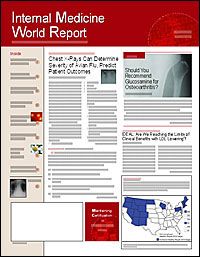Publication
Article
Internal Medicine World Report
Pharmacotherapy Shows Potential for Obesity and Associated Metabolic Abnormalities
Author(s):
Drug treatment can help overweight and obese patients lose weight while improving a host of obesity-related metabolic disorders, ac?cording to 2 recent studies. The data also show that the best results are achieved when pharmacotherapy is used as an adjunct to behavioral modification.
Thomas A. Wadden, PhD, and col?leagues at the University of Penn?s?ylvania School of Medicine, Philadelphia, found that adding behavioral therapy to treat?ment with the serotonin-norepinephrine reuptake inhibitor sibutramine (Meridia) in obese patients significantly improved weight loss compared with sibutramine treatment alone (N Engl J Med. 2005; 353:2111-2120).
And Jean-Pierre Des?pres, PhD, of Laval Uni?versity, Ste.-Foy, Que?bec, and colleagues elsewhere in Canada reported that the investigational selective can??n?a?bin-oid-1 (CB1) receptor blocker rimonabant (Ac?omplia; San?ofi Aventis) sig?nificantly decreased body weight and waist circumference and improved the metabolic risk factor profile in high-risk overweight or obese patients with atherogenic dys????lipi?demia (N Engl J Med. 2005;353:2121-2134). ? ? ? ?
In the first study, University of Pennsylvania investigators randomized 224 obese adults to 4 treatment groups: (1) 15 mg/day of sibutramine alone, which was given by a primary care physician during 8 office visits that lasted 10 to 15 minutes each; (2) lifestyle-modification counseling alone, delivered in 30 group sessions; (3) sibutramine treatment along with 30 group sessions of lifestyle-modification counseling, so-called combination therapy; or (4) 15 mg/day of sibutramine plus brief lifestyle-modification counseling delivered by a primary care physician during 8 visits of 10 to 15 minutes each.
All participants were prescribed a daily diet of 1200 to 1500 kcal and ad?vised to walk 30 minutes a day on most days of the week.
Results showed that the combination therapy approach resulted in an average loss of 12.1 kg at 1 year. The magnitude of weight loss in this group was roughly twice that of the groups receiving either sibutramine alone (5.0 kg) or lifestyle-modification counseling alone (6.7 kg).
The investigators say their findings strongly argue in favor of a weight-loss approach that uses medication as an adjunct to a comprehensive program of diet, exercise, and behavioral therapy.
In the 12-month Rimonabant in Obesity-Lipids (RIO-Lipids) study, in?vestigators assigned 1036 overweight or obese patients with untreated dys?lipidemia to placebo or a 4- or 20-mg dose of rimonabant in addition to a hypocaloric diet.
Use of high-dose rimonabant was associated with a mean weight loss of 6.7 kg, a 5.8-cm decrease in waist circumference, a 10% increase in high-density lipoprotein cholesterol, and a 13% decrease in triglycerides. High-dose rimonabant use also produced a 57.7% increase in plasma adinopectin levels. All results were statistically significant compared with placebo.
The weight loss and decreases in waist circumference occ?urred?during the first 9 months of treatment and then stabilized un?til the end of the 12th month of the study.
The investigators con???cluded that al?though drug treatment alone will not "eradicate" obesity, the study demonstrates that CB1?receptor blockade is a "clinically relevant" appr?oach for improving the unfavorable cardiovascular risk profile in high-risk overweight or obese dyslipidemic patients.
In an accompanying editorial (pages 2188-2189), Susan Z. Yanovski, MD, director, Obesity and Eating Disorders Program, National Institute of Diabetes and Digestive and Kidney Diseases, Bethesda, Md, acknowledged the "need for adjunctive treatments that can assist patients in carrying out the changes in lifestyle needed to produce and sustain weight loss."
Dr Yanovski was quick to em????phasize, however, that the history of weight-loss medications is "checkered." Citing ?fen?fluramine and dexfenfluramine as examples, she noted that "unusual ?complications or those that occur only with long-term use or in ?combination with other medications may not become apparent until a drug is used in large populations for an extended time."?
She also pointed out that obesity drugs carry a risk for abuse, given the societal emphasis on thinness. A drug that helps people lose weight "will undoubtedly be used not only to reduce medical risk among those who are obese but also improve ?ap?pearance among those who are less likely to have a medical benefit from weight loss." The potential for abuse necessitates a rigorous evaluation of the safety of antiobesity medications, she added.
Finally, Dr Yanovski said that an ?important goal in obesity research is the development of better strategies, both for treatment and the primary prevention of obesity.





